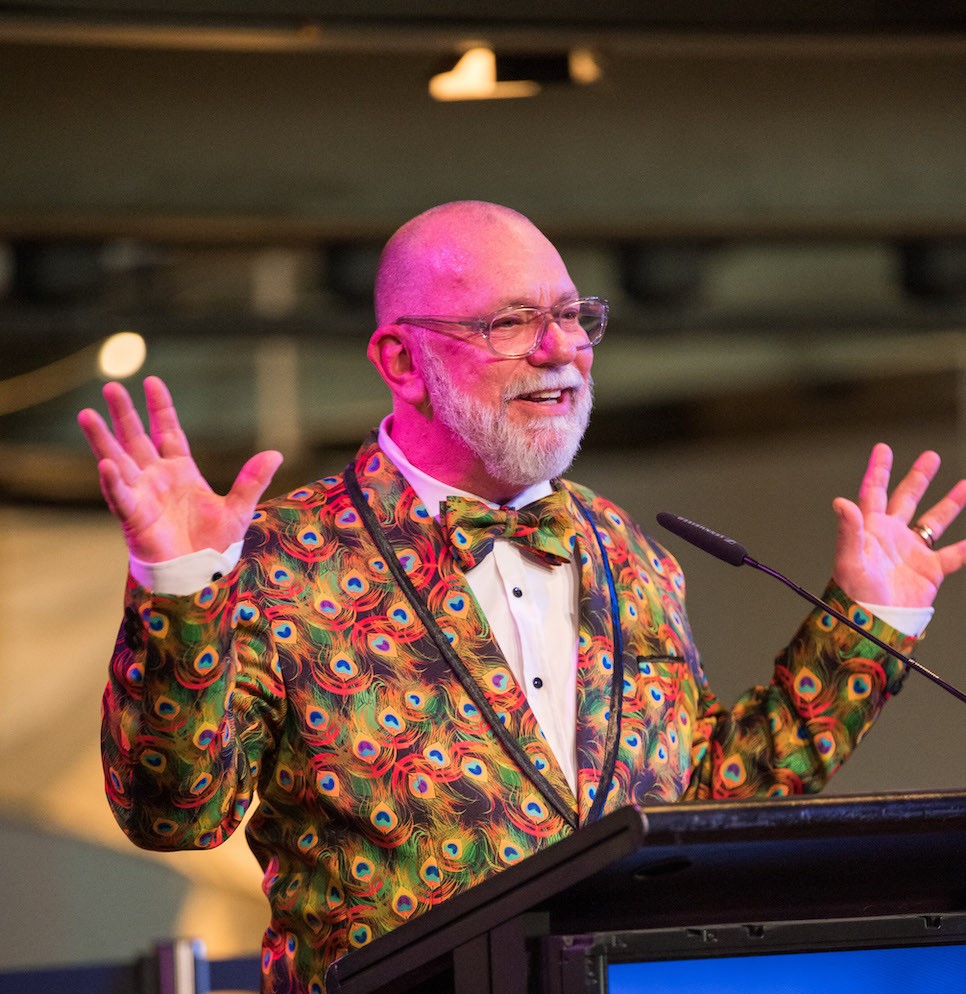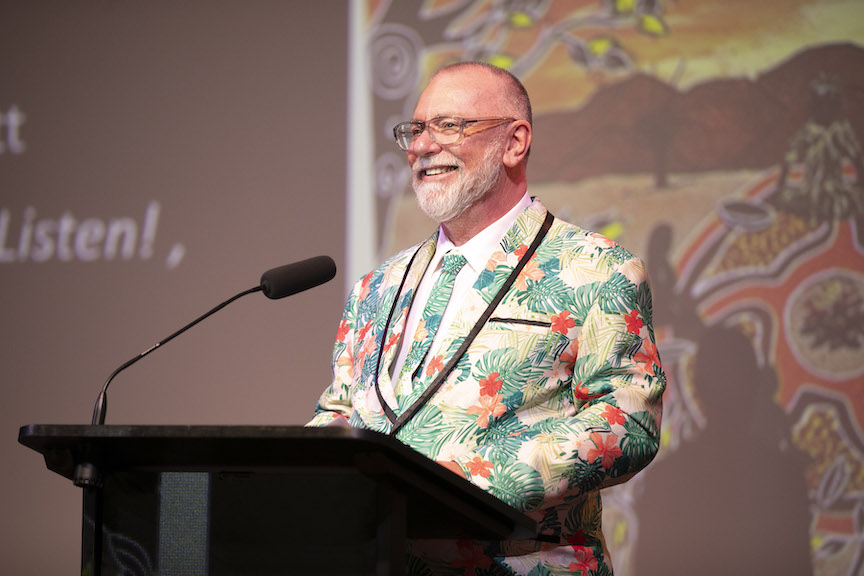Turbine halls and boiler rooms – we think of them as relics from a bygone era of power generation and, yet, Tate Modern in London has shown how such post-industrial sites can be successfully reactivated as creative mixed-use venues.
The trend, however, is not exclusive to examples abroad, as Craig Donarksi would attest. Donarski was the Director of Casula Powerhouse Arts Centre (Casula), in Sydney’s metropolitan south-west, from 2016 to 2023, and has recently been appointed the inaugural Manager Arts, Culture and Creative Industries for White Bay Power Station (White Bay), on the fringe of Sydney’s CBD.
ArtsHub catches up with Donarski as he reflects on what it took to transform a venue with the complexity of a power station, and how he grew audiences at Casula – a skill that he will bring to White Bay with its high expectations for engagement.
Jump to:
A trajectory that made sense
In late November last year, Placemaking NSW announced its appointment of Craig Donarski.
‘I set my final day at Casula, as one day after my seventh anniversary,’ he tells ArtsHub. ‘When I was recruited by Kiersten Fishburn, who was CEO of Liverpool Council at the time, she wanted a minimum five-year commitment. And I said, “I don’t do anything for less than seven”.’
Prior to Casula, Donarski had spent 12 years at the ABC as an Executive Producer for Triple J, 11 years at Sydney Opera House promoting the Studio, and seven years at Sydney Film Festival as its Marketing Manager. But, he adds, ‘Converted dirty coal-fired power stations seem to be a fit with me.’
Donarski says he had been attracted to the building at Casula since the 1990s. ‘It was the first time that I had the opportunity to bring together all of my enthusiasms under the one roof.’ Similarly, part of his brief for the Studio, he says, ‘was to bring in people who don’t normally go to Sydney Opera House’.
‘We dragged the average age down from where it was – which was 55-plus at the end of 1999.’
He adds that the Studio gave him a wide range of performing arts experience, from music to comedy, to cabaret, to festivals, which was then expanded during his time at Sydney Film Festival. One of his greatest learnings was taking ‘the show on the road to regional centres, to places that didn’t normally get – as someone in Charters Towers once described to me – “films with writing at the bottom”,’ he says.
Donarski says the final link that landed him at Casula – and which was in part responsible for the venue’s success under his helm – was his passion for food. ‘One of the really central things to the renaissance of Casula was putting in a really compelling food offering. When I started, it had the most dreadful cafeteria. Functional, but boring as hell. One of the things Kiersten said to me was “fix the food!”
‘My partner, Jackie McMillan, had been a dining editor for many years and, by being her unnamed dining companion, I got to learn a lot about the industry, and about what works and what doesn’t.’
But Casula’s success was more than just a swanky menu and a cool ambience. Rather than turning over the concession to a leasehold, as is the norm, Donarski brought the restaurant team on to staff.
‘It’s actually a team employed position, which was really unusual.’ The move was received, ‘with great scepticism at first, but after a while, everyone saw how it can then become part of the programming,’ he says.
‘So, for example, during a film festival we might screen a documentary about Venezuelan barbecues, so we could put on a Venezuelan barbecue in the Turbine Hall before the film. It was probably the single most transformative thing to introduce to the site.
‘That greater integration, and really working much more hand-in-glove with the programming of the centre – to hit an idea or a theme that could branch off into all of these different tangents and directions, aimed at different audiences, all simultaneously – is a holistic platform for culture,’ Donarski tells ArtsHub
He adds that one of the last exhibitions staged under his tenure, Flight, was a great example of the success of this model.
What’s the secret to finding audiences?
Donarski reveals that one of the greatest lessons of his career came during his time at the ABC. ‘That was where I first really learned about the differences between the audiences. Triple J was originally a very inner city kind of station, but as soon as we started going to places like Darwin, it opened our eyes to how you really had to adapt to accommodate the interests and concerns of those wider audiences,’ he says.
‘That was taken even further at the Opera House, where we were trying to generate a series of audiences for different genres and different art forms. That really requires an approach of thinking about the potential audiences for each of those shows, and how you can reach the people that would be interested in those shows and convince them to come back,’ he continues.
Donarski has maintained this approach throughout his career, and will again utilise it when considering the new site of White Bay Power Station.
Read: Sydney gets a Turbine Hall, with 2024 Biennale venue reveal
Being part of local government at Casula allowed him to connect with its community resources, he explains. ‘Councils are the pointy end of service delivery, and you can draw on that brains trust of the Council and say, “Hey, we’re thinking of doing this thing; who should I be talking to?”,’ he says, admitting that it took time to work on this and deepen those connections.
Casula sits within an LGA (Local Government Area) that is ‘spectacularly diverse – you’ve got people from over 150 countries speaking over 140 different languages, and no single group even hits double digits in percentages,’ says Donarski.
To use that ‘C word’ – challenge – is it difficult to create a sense of ownership with diverse audiences?
‘To an extent, yes,’ says Donarski. ‘But we did find that our catchment area – the radius that people were coming to us from – was much wider than I would have expected.’ He adds that the art centre’s location on a train line with a dedicated station was a huge factor when it came to sustaining its audience.
‘Casula is totally off the beaten track, and at the end of a very long private driveway, so nobody stumbles upon us. The only people that go to Casula are intending to go to Casula,’ Donarski says of the organisation’s greatest challenge.
‘One of the broader challenges was the discrepancy between ambition and resources. We were very good at “smoke and mirrors”, in terms of people thinking that we got more funding than we actually did. And we got very good at driving the dollar.’
He adds that one of the persistent challenges for Casula was the lack of stability with multi-year funding, and falling into the gap between the city and regional as a metropolitan-based gallery.

What were the milestones during his tenure at Casula?
Donarski believes that one of the great dreams to get across the line was reducing that gap in geography.
‘Getting more of the great festivals of Sydney to commit to having a serious presence at Casula, so that people could experience Sydney Festival, Sydney Writers’ Festival, the Biennale of Sydney or Sydney Film Festival. People should be able to expect to be included without having to schlep into the city, and so those festivals really become, you know, real,’ he says.
The other thing he is most proud of, is that aforementioned cross-arts model. ‘A multi-form art space with a truly multi-lens way of being able to tackle a topic in different ways all at once: highbrow, middlebrow, lowbrow and no brow – for adults and kids and all the points between A and Z.’
He continues: ‘That kind of approach to programming enables you to pair big name artists with an emerging artist, with a kind of democratic equivalence that really helps lift up earlier career artists.
‘The curatorial team that is in there now will keep this flag flying but, at the same time, will remain committed to always thinking about audiences first, because if you don’t have an audience, then what are you doing?’
How will that model be introduced at White Bay Power Station?
‘In the same way that I had my eye on Casula for a long time, before working there, I first went to White Bay Power Station about 10 years ago, back when I was working at Sydney Film Festival. Catherine Martin and Baz Luhrmann had just finished shooting The Great Gatsby – a lot of which had been filmed there.
‘They held their wrap party there, and I was walking through this place with stages for DJs and performers, and bars and dancing, and I thought, “Oh my God, this is the most incredible space ever.” It was so atmospheric with that post-industrial look happening – it revealed the potential, and I was already dreaming, “how [do I get my] hands on this place?”.’
A decade later, Donarski has.
How is a future mapped out for a site of this scale?
‘This is my fifth week on the job. What I’ve been spending the time on up to now, and will continue to do over the coming months, is having conversations with everyone. So far, I’ve commenced over 50 conversations with people across festivals, pop culture, classical, music, dance parties, craft and design, cultural communities, contemporary dance, screen and visual arts. It’s literally trying to talk to absolutely everyone who is interested in the site, and who I would like to get interested in the site.’
Donarski continues: ‘It’s about working out what the next phases are, and the priorities, in terms of the ongoing redevelopment of the site, and how that needs to happen. I don’t underestimate the scale of the task.’
He describes White Bay as a ‘Powerhouse on steroids’.
‘It’s going to be this kind of gradually unfolding and blossoming thing, and that’s going to require a lot of experimentation along the way,’ he says, adding that the goodwill and ‘creative imagining that’s going on is really heartening’.
And those jackets…
Donarski promises that we are going to see more of them. ‘Yes, I have created a monster there! You know, if I wear black people think something’s terribly wrong. I’ve overheard people say, “That’s him,” which makes me laugh.’
In our follow-up story, ArtsHub will drill down on what plans are being laid for White Bay Power Station, and their expected timeline.
Donarski started his new role on 28 November 2023.
The 2024 Biennale of Sydney will be the inaugural event presented at White Bay Power Station, from 9 March to 10 June 2024.





